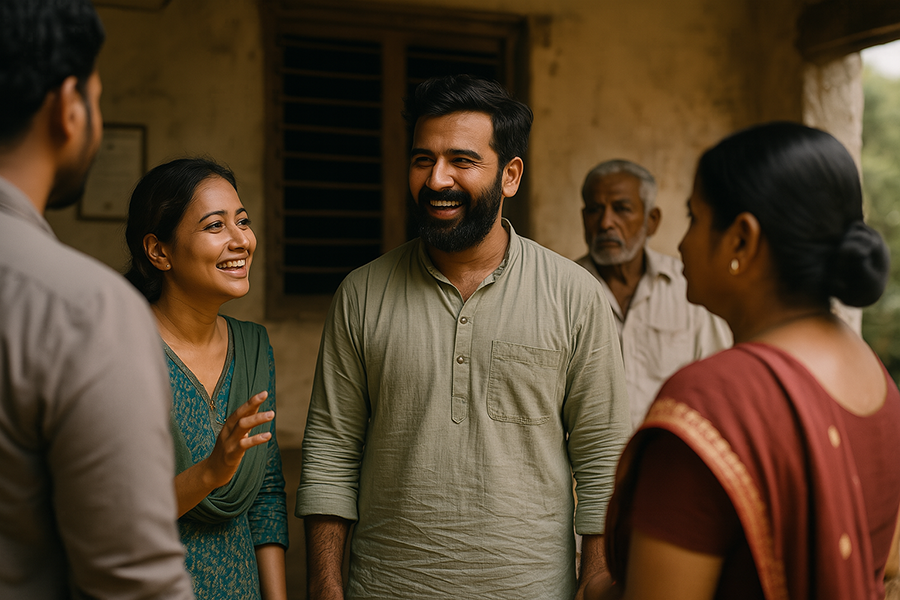The Driving Force for India’s Future
In the vast landscape of India’s societal evolution, the role of millennials stands as a pivotal force that can shape the future trajectory, especially in critical sectors like education, philanthropy, healthcare, livelihood, and women empowerment. The question that echoes is whether this burgeoning population of millennials can constitute an efficient and effective workforce capable of executing the ambitious roadmap laid out for a nation of 130 Crore individuals. The answer lies in recognizing the unique positioning of millennials, both externally in their developmental stage and internally in their capacity to contribute meaningfully to societal goals.
Embracing the Era of Possibilities
Unlike the generations before us, millennials are not constrained by the sole objective of survival. The prevailing notion of insecurity, perpetuated by societal norms, is a falsehood that seeks to limit our potential. Instead, we find ourselves in an era where the pursuit of basic living standards and human rights for all is a tangible goal. This shift in perspective allows us to explore careers that not only offer financial stability but also a profound sense of contribution to a greater purpose. As the perception of security takes root in our lives, the preference for a meaningful career becomes the norm.
Passion as the Driving Force
In the realm of achieving extraordinary feats, it’s the passionate individuals who leave an indelible mark. The adage, “whatever was easy to do has already been taken up and done, only the hard one is left,” holds true. Passion fuels the relentless pursuit of knowledge, skills, and attitude necessary for significant accomplishments. Millennials, armed with passion, possess the potential to bring about transformative change, provided they receive the right guidance and exposure to essential elements like knowledge, skills, attitude, and values.
A Critical Examination
While the passion of the millennial workforce is undeniable, the question arises: Are they receiving adequate guidance? A critical examination of the National Youth Policy 2014, a comprehensive document addressing 600 million young people in India, reveals an imbalance. The policy emphasizes education, skills, and employment extensively, with 106, 72, and 46 references, respectively. Surprisingly, the term ‘Harmony’ garners a mere five mentions, and ‘peace’ receives zero acknowledgment throughout the document. This raises concerns about the guidance provided to the youth and the priorities set for their holistic development.
The Need for Specialized Institutions
In addressing these concerns, we must ponder whether institutions dedicated to the development sector, comparable to the prestigious IIMs, exist. If they do, why haven’t issues like the aforementioned policy gaps been raised? The absence of a robust approach in guiding the nation’s 600 million youth for the past five years demands a shift toward systems thinking, reflective practices, and a visionary approach. This shift is crucial to providing the right direction, training, and leadership development to the youth, steering clear of negative unintended consequences.
The Role of Specialized Academic Institutions
The need of the hour is academic institutions as formidable as IIMs but exclusively dedicated to social sector leadership and workforce development. These institutions should instill a systems thinking approach, emphasize reflective practices, and nurture visionary leaders capable of addressing societal challenges at their roots. The curriculum must go beyond traditional management teachings, fostering a passion for meaningful change and providing a practical approach to turn that passion into optimal impact.
Human Rights and Collective Responsibility
Delving into the wisdom embedded in the Universal Declaration of Human Rights (UDHR), particularly Article 29, underscores the importance of duties to the community for the free and full development of one’s personality. The interconnectedness highlighted by phrases like “human family” and “spirit of brotherhood” emphasizes our collective responsibility toward each other. As free and equal beings, we are born with the inherent ability to distinguish right from wrong and should act toward others in a spirit of friendliness. These principles serve as compelling reasons for the youth to actively contribute to the well-being of their motherland.
Nurturing Change for a Better Tomorrow
Our peace and happiness are intertwined with the collective experiences of those around us. The lack of a viable alternative to our motherland and the inaccessibility of habitable spaces like Mars and the Moon underscore the need to address issues at home. The imperative lies in proving that despite sharing genes, we can break free from harmful habits that have led to adverse situations. This pursuit is not merely for personal gain but to craft a narrative of positive change to share with future generations. It is our chance to face the future with pride, having contributed meaningfully, rather than succumbing to the guilt of inaction.
Bhagat Singh’s Legacy: A Call to Action
As we reflect on our purpose at the age of 25, 30, or 32, Bhagat Singh’s legacy serves as a poignant reminder. A 22-23 year young revolutionary, he wasn’t mad; he was driven by a profound sense of purpose. Now, as individuals in our mid-twenties and beyond, we must ask ourselves: What do we have in our lives to be proud of, or what are we working towards? The answers lie in our ability to contribute meaningfully, to realize India’s potential for positive transformation.
Concluding Thoughts: ISDM and the Path Forward
In concluding this exploration, the relevance of the Indian School of Development Management (ISDM) becomes evident. ISDM stands as a beacon of hope, illuminating paths for socially conscious leaders who understand the nuanced complexities of societal challenges. By shaping change agents capable of dismantling systems that perpetuate injustice, ISDM plays a vital role in the collective journey toward realizing India’s true potential. As we navigate the future, let ISDM be the guiding light that empowers individuals to contribute meaningfully, creating a future where every citizen is treated with dignity and equality.




